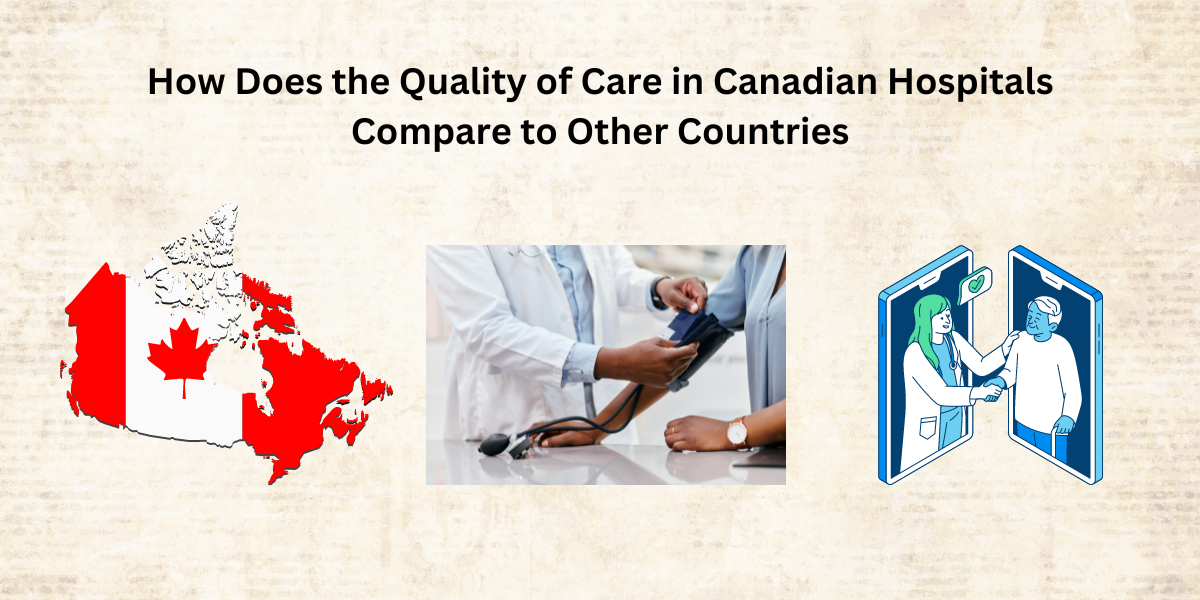How Does the Quality of Care in Canadian Hospitals Compare to Other Countries?
intoduction
Are Canadian hospitals good compared to the ones in other countries? This blog post is going to explore a question. We’ll look closely at how the healthcare in Canada stands up against systems in different parts of the world. You’re going to see where Canada’s healthcare shines and where it needs improvement. We’ll even discuss the hurdles it faces, and include some tips for dealing with it, if you’re thinking of moving to Canada, or just want to know more about how their healthcare compares to others.By the end of this, one may be satisfied with the knowledge that you’re well informed about where Canada’s healthcare lands on the world stage.
Understanding the Quality of Care in Canadian Hospitals
What Defines Quality of Care?
Quality of care is assessed through various factors, including patient outcomes, accessibility, efficiency, and patient satisfaction. In Canada, the healthcare system is publicly funded, meaning that all citizens have access to hospital services without direct charges at the point of care. But how does this system hold up when compared to other countries?
Global Comparisons
Canada is often compared to countries with similar healthcare models, such as the UK, Australia, and other members of the Organisation for Economic Co-operation and Development (OECD). When considering aspects like patient satisfaction, medical outcomes, and wait times, Canada has both strengths and areas that need improvement.
Advantages of the Canadian Healthcare System: Everyone Gets Care.
A large plus of Canada’s healthcare system is that everybody in Canada, whether they’re born there or moved and now live there permanently, can see a doctor whenever they need it. Everyone can go to the hospital and receive medical services without needing to stress over large bills; this really shows how fair healthcare delivery is across the country.
Top-Notch Medical Teams
The people working in Canadian hospitals know their material. With a portion of the finest med schools around, Canada produces medical professionals such as doctors, nurses, and specialists who are tops in doing their job really well.
Leading Edge in Technology for HealthIn what you may think is stark contrast to some thoughts on Canadian medical scenes, they’re primarily focused on advanced technology. Hospitals in Canada often have advanced equipment for checking health and giving effective treatments to patients, ensuring the best care when you don’t feel well.
Disadvantages of the Canadian Healthcare System:
Waiting a Long Time is the Hardest Part.
A downside people often point out about healthcare in Canada is having to wait a long time for things that aren’t extremely urgent, or for meeting with specialists. If you stacked Canada’s wait times against places like Germany or Switzerland, Canada’s might seem never-ending by comparison… which sometimes means you’re waiting for help you need fairly soon.
Not Everything is Covered
What gets fraught is the coverage spectrum. The data protection of choice is for basic hospital and doctor coverage; is very helpful–but then it’s on you or your insurance for the extra items, such as fixing your teeth, medicine you might need regularly, or therapy sessions. This ends up meaning not everyone might get all the care dimensions they’d ideally want.
Problems and Concerns:
Shortage of Healthcare Workers
In Canada, although it may seem incongruous, we’re running low on healthcare workers, like nurses and specialists, even though our medical training is extremely good; this makes people wait longer to get care and can make the care they get not as great.
Aging Population
Our country deals with the growing issue of an aging population needing more healthcare, especially for things used by older people. Because there are more and more elderly people needing help, hospitals are having a hard time; this worry is about whether our healthcare can keep up with many needs as time goes by.
Unequal Access in Rural Areas
Getting to see a doctor or get hospital care is significantly hard in the countryside of Canada; the hospitals out there often don’t have enough money or people working there, making their care not as good as in major cities. If you live there, you might have to travel a long distance for any special treatment.
Dos and Don’ts When Navigating Canadian Healthcare
Dos:
- Do Take Advantage of Preventive Care: Canada offers various preventive services, including vaccinations and routine screenings, which can help you avoid more serious health issues down the line.
- Do Use Walk-In Clinics for Minor Issues: For non-emergency health concerns, walk-in clinics are a convenient option that can reduce the strain on hospital emergency rooms.
- Do Advocate for Yourself: If you feel your concerns aren’t being addressed, don’t hesitate to ask questions or request a second opinion.
Don’ts:
- Don’t Wait Until the Last Minute for Specialist Referrals: If you need to see a specialist, get a referral as early as possible to avoid long wait times.
- Don’t Ignore Mental Health: Mental health services may not be as readily available as other healthcare services, so be proactive in seeking out support if needed.
- Don’t Assume All Services Are Covered: Always check what services are covered under your provincial health plan to avoid unexpected costs.
faqs
1.What’s happening with the extremely long wait times at Canada’s hospitals?
In universal reality, there’s an interesting combination of things causing the delay; they’re dealing with not enough health workers, too many people needing care, and just not enough material in hospitals to go around.
2.Do people in Canada have to pay for healthcare?
Not exactly pays directly for items such as hospital visits or seeing a doctor because it’s all paid for by public funding.
But, if you need certain meds or must see the dentist, you might have to pay some money. When it comes to emergencies,
3. How good is Canada’s system?
When things are seriously bad, Canada’s got your back And you’ll get the help you need quick–but if it’s not extremely urgent, you’re going to spend some time waiting in the ER.
4,How different is healthcare in Canada compared to the U.S.?
The important thing is that everyone in Canada can get healthcare because it’s universal. In the U.S. you need insurance for healthcare, and it’s completely about private companies, which makes costs, getting to see doctors, and what’s covered pretty different.
5.How does Canada take care of older people who need health services?
Canada has measures in place for the elderly such as sending help to their homes or having special places where they can live and be looked after–but as more people get old, it’s getting harder to keep up because all people need help.
So to understand it, there’s a path to learning and good judgment in understanding everything, especially with healthcare. While it is considered true that wait times and funding are important talks in Canada, it shows that healthcare’s setup is noticeably focused on making sure everyone’s covered, in clear ways.
My advice
Communicate. Speak up and ask your healthcare providers many questions. It’s vital to ensure they think carefully about your concerns and personalize your care. A lot of involvement with your health team boosts your chances of receiving the care you really need.
my conclusion
Yes, navigating Canadian healthcare with its mix of terrific resources and potential challenges may seem daunting–but keeping a proactive attitude and being knowledgeable on how to leverage the system in your favor empowers you. Canadian healthcare, with all its complexity, offers amazing opportunities for those ready to approach it with awareness and participation.
Accept it thoughtfully, make informed decisions, and remember that no health system is perfect yet staying involved could significantly improve your healthcare experience.







